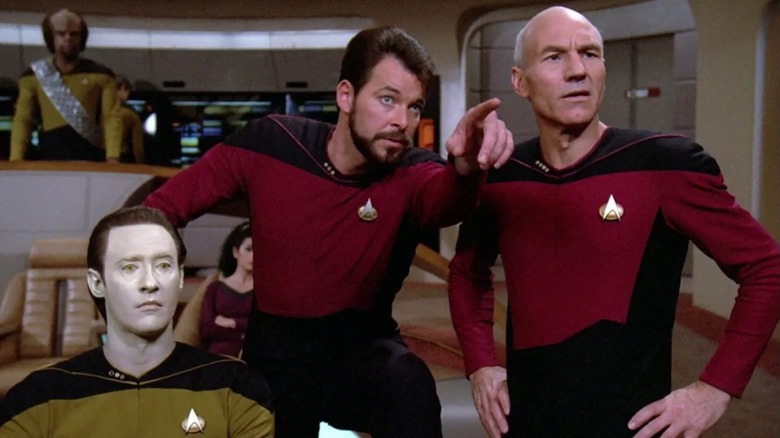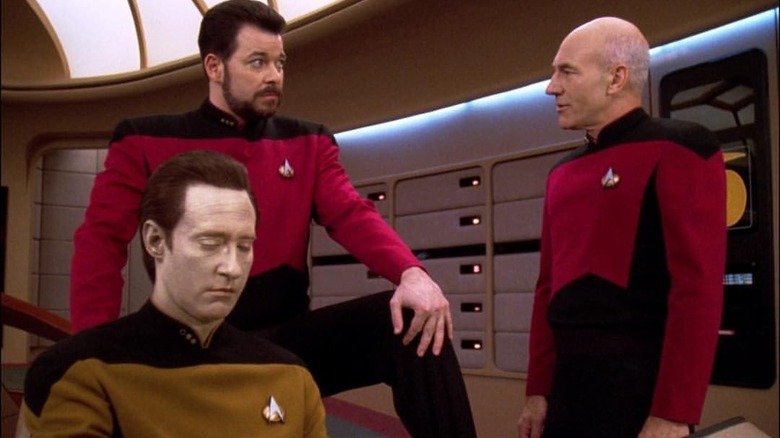Jonathan Frakes Has One Complaint About Star Trek: The Next Generation
Many Trekkies tuned into the original "Star Trek" because of the careful, perfect balance between its three lead characters. On one side, there was Spock (Leonard Nimoy), who lived without emotions and devoted his life to logic. He was a being of intellect and reason. An Apollonian figure. Opposite Spock was Dr. McCoy (DeForest Kelley), who lived according to passion, anger, and outrage. He was a being of emotion and instinct. A Dionysian figure. Then, in between them, you had Captain Kirk (William Shatner), a being of judiciousness, authority, and balance. He was a command figure who could synthesize both the intellect and the body. Spock, McCoy, and Kirk, briefly, provided a mind-body-soul triune.
When "Star Trek: The Next Generation" launched in 1987, the well-worn "Star Trek" triune was studiously avoided. For his new show, creator Gene Roddenberry wanted a better-rounded dynamic across a larger ensemble cast. Instead of a show with three lead actors and a handful of supporting staff, "Next Generation" was to be a show with seven main characters, all of them interacting professionally and expertly to any given space crisis. By the third season of "Next Generation," individual characters began getting their own episodes, and their vast network of interpersonal relationships could be more meaningfully explored.
Some might argue that the ensemble approach made "Next Generation" the superior show, but others lamented that there wasn't a central triune to hold the series together like in the 1960s. In the oral history book "The Fifty-Year Mission: The Next 25 Years: From The Next Generation to JJ Abrams," edited by Mark A. Altman and Edward Gross, actor Jonathan Frakes went on record as one of the latter. He loves "Next Generation," but regrets that Riker (Frakes), Data (Brent Spiner), and Captain Picard (Patrick Stewart) never got a Kirk/Spock/McCoy thing going.
Kirk/Spock/McCoy ≠ Picard/Data/Riker
It should be noted that Gene Roddenberry, when he was putting together "Star Trek: The Next Generation," instigated a notorious rule that the show's writers generally hated. By Roddenberry's mandate, there was to be no interpersonal conflict between the show's main characters. The idea was that, in the future, all people were equally devoted to their work in Starfleet and they wouldn't waste any time bickering. This was a fine vision for the future, but it stymied writers who couldn't think of any other ways to manufacture drama.
As such, the days of Spock and McCoy butting heads and hurling insults were behind us. Which, for Frakes, was a pity. There was a lot of color and personality in the three-way arguments that Kirk, Spock, and McCoy had. "Next Generation" was its own entity, but Frakes mourned that he wasn't on a show that would have allowed him to engage in similar banter:
"I only wish we'd found a way to have the irony and tongue-in-cheek banter of the triumvirate of the original. Picard, Data, and Riker should have that. We had our own relationship, but there are moments between Kirk, Spock, and McCoy that I've always envied. That's a small complaint in a show that I was very proud to be a part of."
Picard was a taciturn figure, less affable and approachable than Kirk. Data was logical and emotionless like Spock, but never became annoyed by his co-workers' illogic; he was just there to help. And, of course, Riker wasn't grumpy and outraged like Dr. McCoy, but jocular and genial. Even if the three characters had developed a central rapport on "Next Generation," it wouldn't have been the same. I understand what Frakes might be missing, but what we got was so much better.

